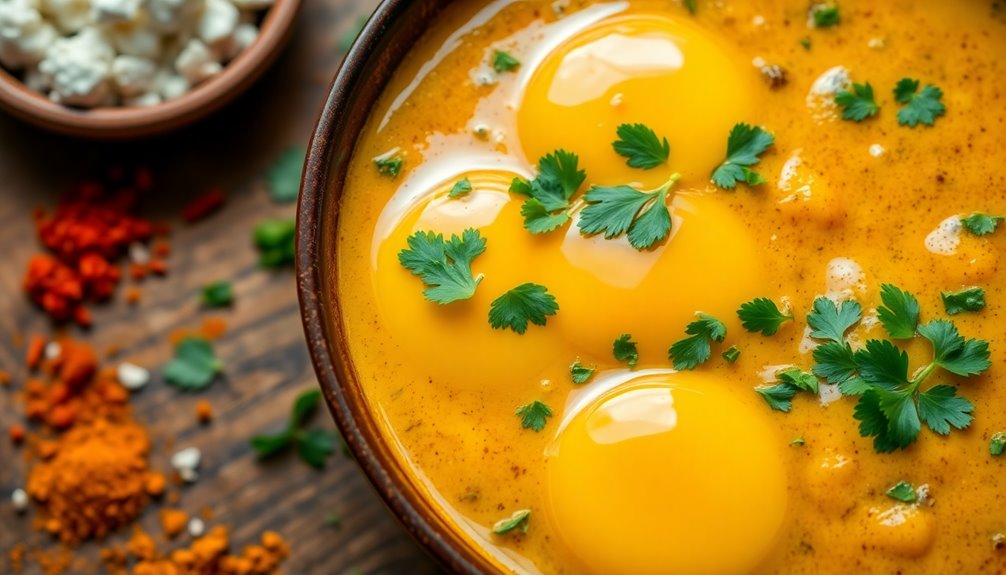Curry eggs combine the comforting texture of eggs with aromatic curry flavors, creating a versatile dish. You can make it with hard-boiled eggs or scrambled eggs, perfect for breakfast or quick dinners. The rich combination of spices, coconut milk, and pureed tomatoes brings depth to the dish. Serve it with rice or flatbreads for a complete meal. If you're curious about different variations and cooking methods, there's plenty more to explore!
History
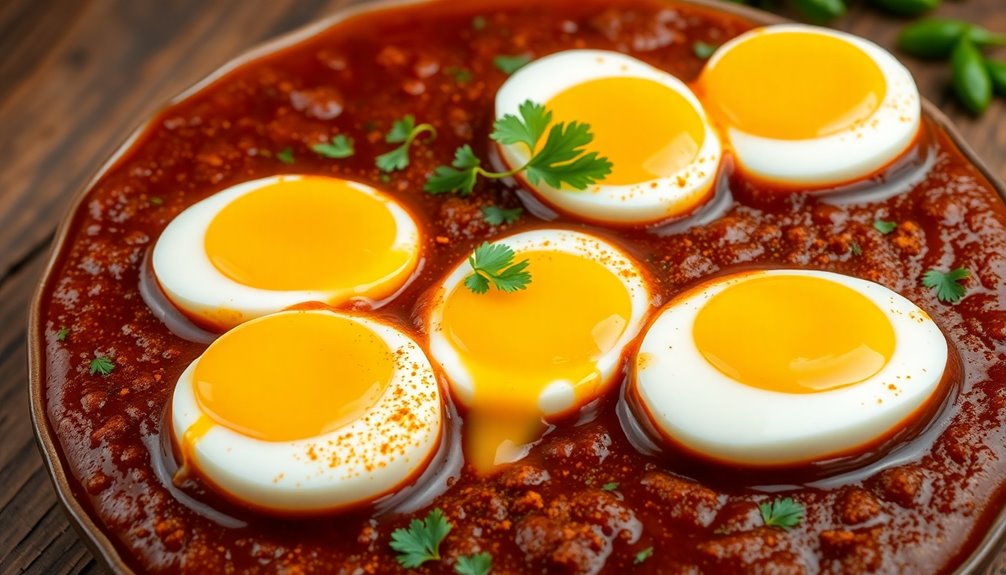
Curry has a rich history that traces back to ancient India, where diverse spices and cooking techniques laid the foundation for many regional dishes, including egg curry.
This dish gained significant popularity in Indian cuisine during the 19th century, largely due to British colonial influence, which encouraged the use of eggs in local recipes.
As you explore egg curry, you'll discover numerous regional variations across India, each state contributing its unique spices and cooking methods. For instance, the Punjabi dhaba style is known for its rich and flavorful gravy.
Beyond India, egg curry has found its way into Southeast Asia and the Caribbean, where local ingredients create new tastes. Its versatility allows for endless adaptations, catering to different preferences and cultural influences.
Recipe
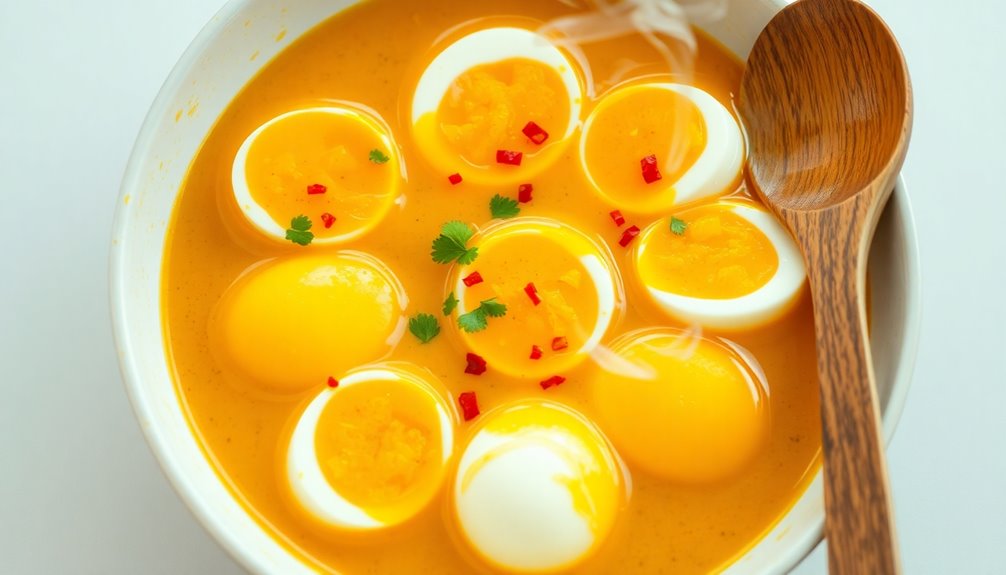
Curry eggs are a delightful dish that combines the comforting texture of eggs with the rich, aromatic flavors of curry. This dish can be tailored to suit different tastes, whether you prefer the classic method of using hard-boiled eggs simmered in a spiced gravy or a quicker version with beaten eggs cooked in a skillet.
The versatility of curry eggs makes it an ideal choice for breakfast, lunch, or a quick dinner, and it's a great way to incorporate protein into your meals while enjoying a burst of flavor.
To prepare curry eggs, you'll first need to gather your ingredients and decide on the method you'd like to use. If you opt for hard-boiled eggs, you'll simmer them in a flavorful sauce made from pureed onions and tomatoes, seasoned with a blend of spices. Alternatively, for a simpler approach, you can whisk beaten eggs with curry powder and quick-cook them in a skillet.
Regardless of the method, this dish is sure to impress with its simplicity and adaptability.
Ingredients:
- 4 hard-boiled eggs (or 4 beaten eggs)
- 1 cup pureed onions
- 1 cup pureed tomatoes
- 2 tablespoons curry powder
- Salt to taste
- Pepper to taste
- 1 tablespoon oil (for skillet method)
- Optional: ¼ cup coconut milk or soy sauce
- Optional: shredded cheese
To prepare the dish, if using hard-boiled eggs, start by peeling the eggs and setting them aside. In a pan, heat some oil over medium heat, then add the pureed onions and sauté until golden.
Next, add the pureed tomatoes, curry powder, salt, and pepper, and cook until the mixture thickens. Gently place the hard-boiled eggs into the sauce, letting them simmer for 5-10 minutes to absorb the flavors.
For the beaten egg version, heat oil in a skillet, whisk together the eggs, curry powder, salt, and pepper, then pour into the skillet. Cook on medium heat, stirring occasionally until the eggs are firm, and finish with optional cheese or additional ingredients if desired.
Extra Tips: When cooking curry eggs, feel free to experiment with spices to create a flavor profile that suits your palate. You can add ingredients like garlic, ginger, or chili peppers for a spicy kick.
If you're aiming for a creamier texture, incorporating coconut milk will enhance the dish's richness. Also, adjust the cooking time based on your preference for yolk doneness; adding beaten eggs towards the end of cooking will give you a runnier yolk, while longer cooking will yield firmer eggs.
Enjoy your culinary adventure with this adaptable and delicious dish!
Cooking Steps
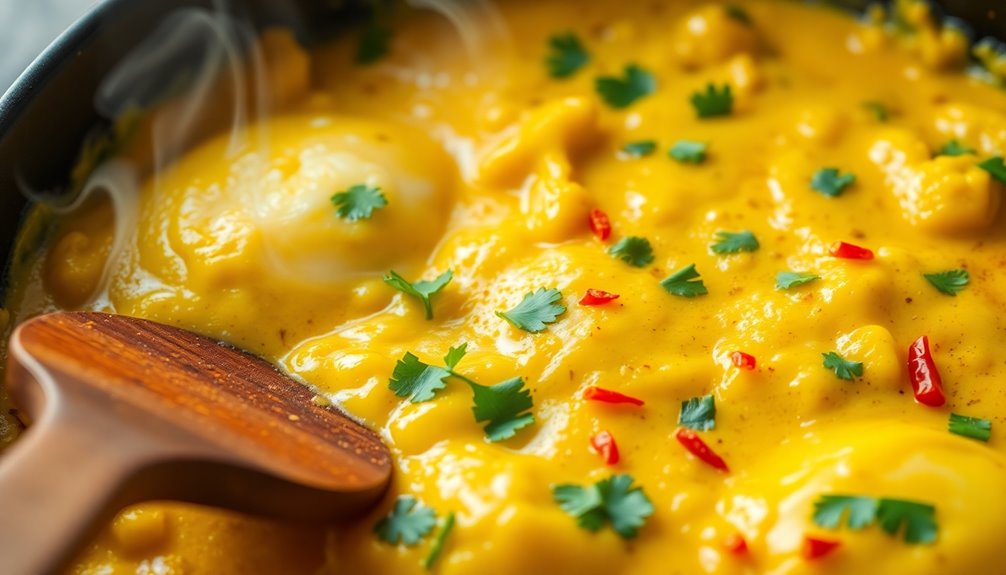
To make delicious curry eggs, you'll start by boiling the eggs until they're hard-cooked.
While they cool, you can sauté onions until they're golden brown and add spices for that rich flavor.
Finally, you'll simmer everything together, incorporating coconut milk for creaminess and then adding the boiled eggs to the curry.
Step 1. Boil Eggs Until Hard-Cooked
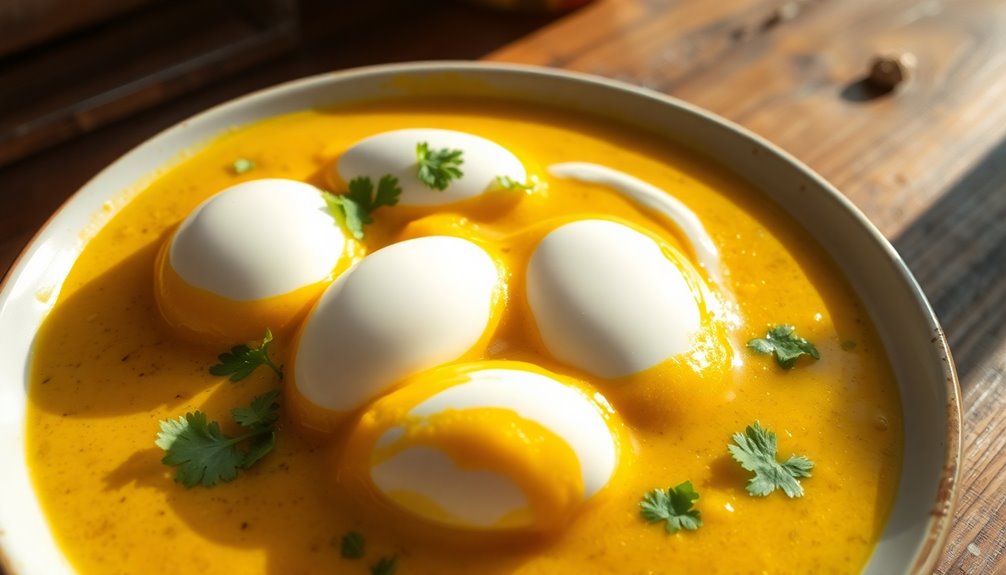
Boiling eggs until they're hard-cooked is a straightforward process that yields delicious results.
Start by placing your eggs in a pot and covering them with 3 to 4 cups of cold water, ensuring they're fully submerged. Bring the water to a rapid boil over high heat.
Once boiling, cover the pot and remove it from heat, letting the eggs sit for 9 to 12 minutes, depending on how firm you want them.
After this resting period, transfer the eggs to a bowl of ice water for at least 5 minutes to cool. This step prevents overcooking and makes peeling easier.
If you're planning to use them in an egg curry, prick the boiled eggs with a fork to enhance flavor absorption.
Step 2. Sauté Onions Until Golden Brown
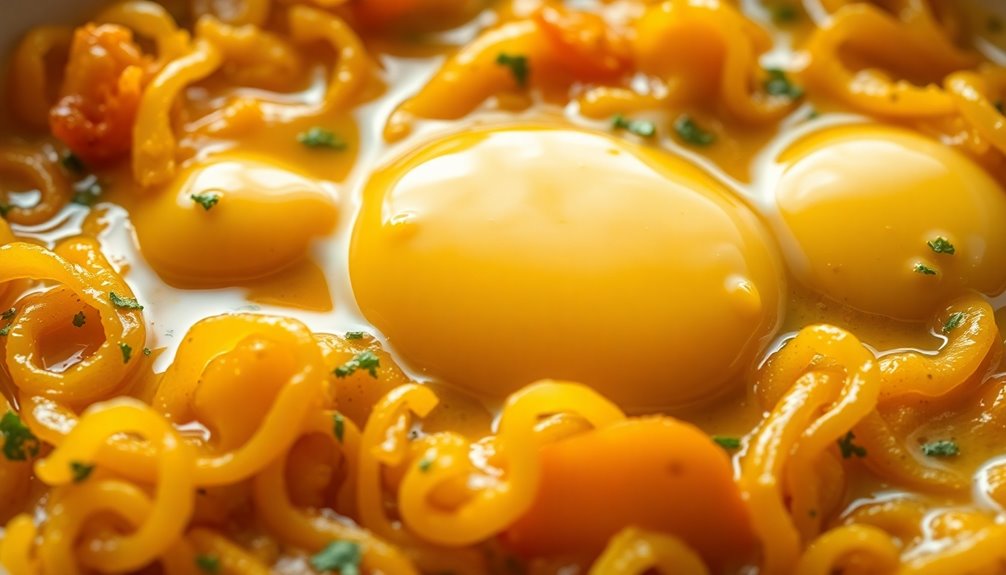
Sautéing onions until they're golden brown is a key step in creating a rich onion tomato masala for your egg curry.
Start by heating oil in a pan over medium heat. Finely chop or puree your onions for a smoother texture, which helps reduce bitterness. As you add the onions to the hot oil, stir continuously to prevent burning and ensure even caramelization. This process usually takes about 8 to 10 minutes.
First, the onions will turn translucent, and then they'll gradually develop that desirable golden brown color. For quicker browning, consider adding a pinch of salt; it helps draw out moisture and enhances the flavor.
Once they reach that golden brown stage, you're ready to move on!
Step 3. Add Spices for Flavor
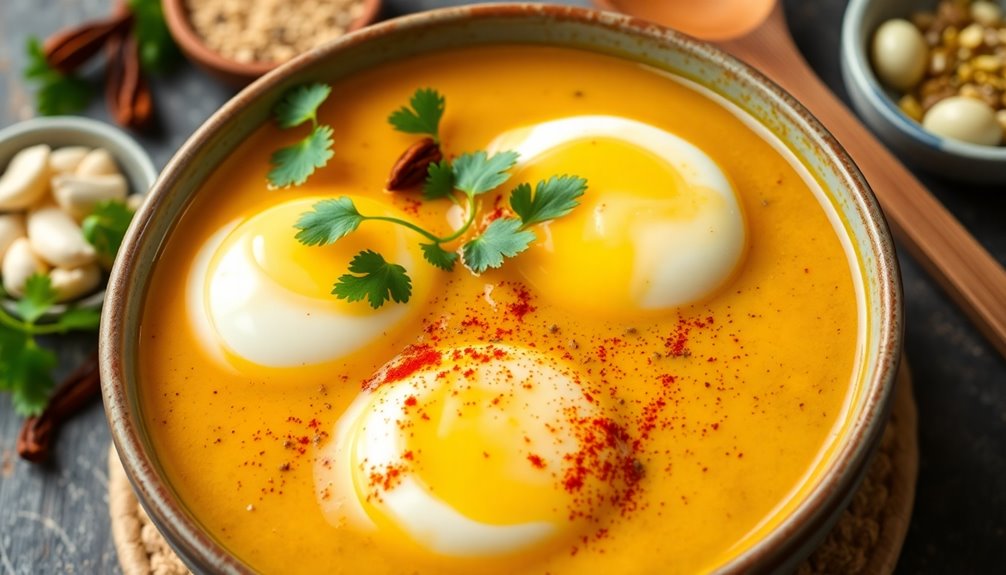
Once your onions have reached that perfect golden brown, it's time to elevate the flavors by adding spices.
Start by sautéing whole spices like bay leaves, cinnamon, and cardamom in oil to infuse aromatic flavors into your curry base.
Next, stir in ginger garlic paste, enhancing the aroma and depth of flavor. Add pureed tomatoes and cook until thickened, forming a rich masala.
Now, it's time to incorporate your spice powders—red chili powder, garam masala, coriander powder, and turmeric.
Make sure to sauté them until the oil separates from the masala for optimal flavor extraction.
For a finishing touch, you can add crushed kasuri methi or adjust spice levels to suit your taste, creating a deliciously balanced egg curry. Additionally, you can serve this dish alongside toasted bread to complement the flavors, similar to how one enjoys a traditional Cacciucco.
Step 4. Simmer With Coconut Milk

As you prepare to elevate your curry, adding coconut milk transforms the dish into a rich and creamy delight.
Once you've sautéed the onions, tomatoes, and spices, stir in about 1 cup of coconut milk. This addition enhances the flavor without overpowering the dish.
Make sure to incorporate the coconut milk after the base masala has thickened, ensuring it blends smoothly. Let the curry simmer for an additional 5-10 minutes, allowing the flavors to meld beautifully.
During this time, the sauce thickens slightly, creating a luxurious texture. The coconut milk not only adds creaminess but also lends a subtle sweetness that balances the heat from the spices, making your curry appealing to everyone.
Enjoy!
Step 5. Add Boiled Eggs to Curry
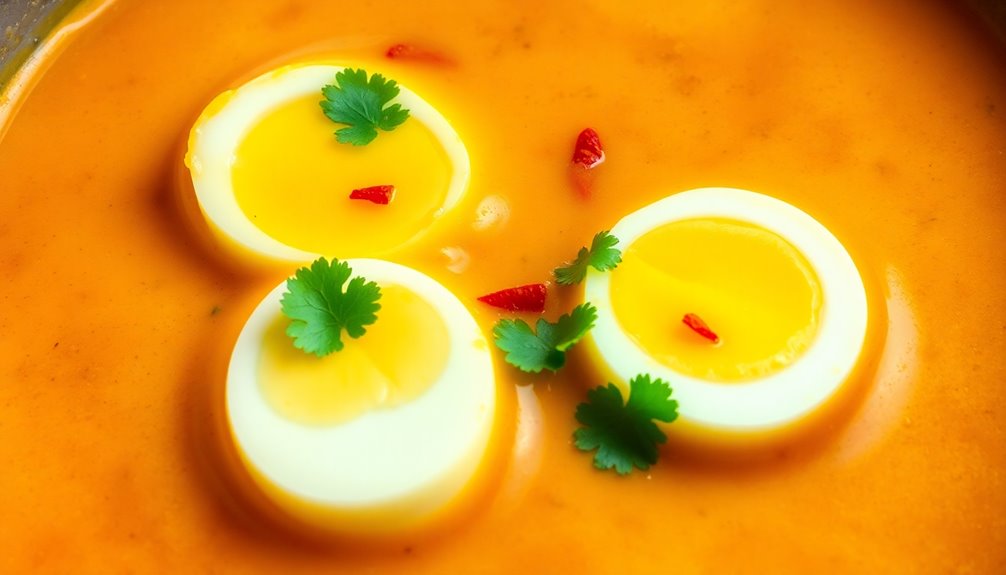
To create a delicious curry with boiled eggs, start by boiling the eggs for about 10-12 minutes until they're hard-boiled.
Once done, immerse them in cold water, shell them gently, and prick each egg with a fork to enhance flavor absorption.
In a separate pan, prepare the onion-tomato masala by sautéing finely chopped onions until golden.
Add ginger garlic paste, then stir in pureed tomatoes and your favorite curry powder.
Once the masala thickens and oil separates, add water to create a gravy.
Allow it to boil before gently incorporating the fried boiled eggs into the mixture.
Simmer for 5-10 minutes, letting the boiled eggs soak up the rich spices.
Finish with crushed kasuri methi or cream for added flavor.
Final Thoughts
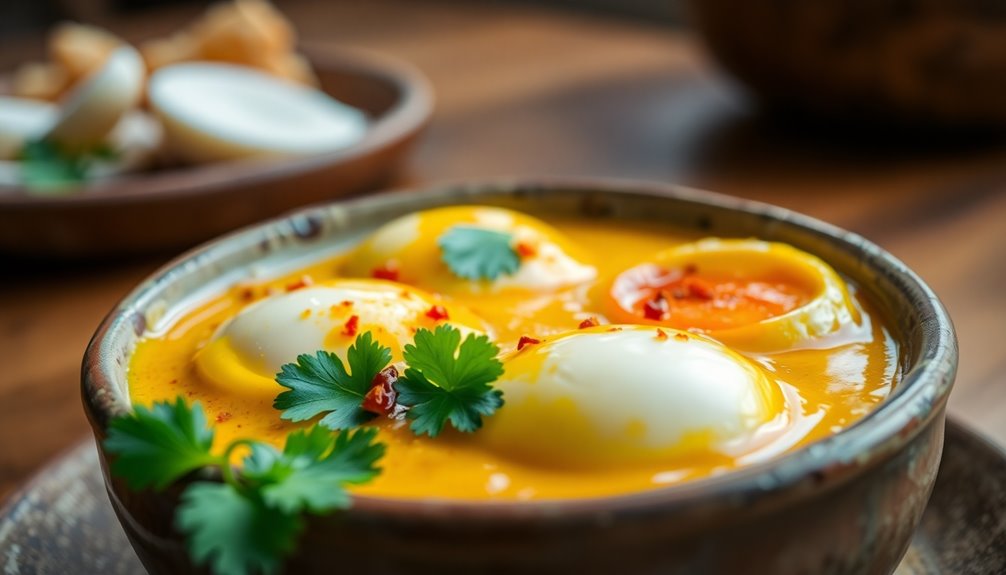
While exploring the world of curry eggs, you'll find that this versatile dish can easily fit into your cooking routine.
Whether you opt for a traditional Indian curry recipe or a quick version like curried scrambled eggs, the possibilities are endless. Using pre-mixed curry powder makes it accessible for busy weeknights, ensuring rich flavors without the hassle.
You can choose to have hard-boiled eggs for a hearty meal or add them at the end for that runny yolk experience, catering to your personal taste. Plus, incorporating coconut milk adds creaminess and depth to the sauce.
With straightforward preparation and the ability to customize, curry eggs are a delightful addition to your culinary repertoire. Enjoy experimenting and savoring each bite!
Frequently Asked Questions
Can I Eat Eggs With Curry?
Absolutely, you can eat eggs with curry! The combination works beautifully, as eggs soak up the rich flavors and spices found in various curries.
You can choose hard-boiled, soft-boiled, or even runny yolks based on your preference. Whether you prefer spicy masalas or creamy coconut sauces, eggs add a protein boost and a delightful texture.
Just make sure to use quality eggs for the best flavor and nutritional benefits. Enjoy experimenting!
What Is the Difference Between Curried Eggs and Deviled Eggs?
Curried eggs and deviled eggs both feature creamy fillings, but they're distinct in flavor and presentation.
While curried eggs mix cooked eggs with curry powder for a spicy kick, deviled eggs blend yolks with mayonnaise and mustard for tanginess.
You'll find curried eggs served cold as a sandwich spread, while deviled eggs shine as bite-sized appetizers.
Both dishes offer customization, letting you add your favorite spices or toppings to create a unique treat.
Are Eggs Used in Indian Cuisine?
Yes, eggs are widely used in Indian cuisine!
You'll find them in various dishes, from spicy egg curries to popular street foods like egg rolls. Each region puts its twist on egg recipes, showcasing unique flavors and ingredients.
When you enjoy traditional Indian dishes, spices like turmeric and garam masala enhance their taste.
Eggs' versatility means you can enjoy them boiled, fried, or scrambled, making them a staple in many households.
What Are the Benefits of Curried Eggs?
Curried eggs offer a range of benefits that make them a great addition to your diet.
They're packed with protein, which supports muscle repair and overall health. The spices, especially turmeric, provide anti-inflammatory properties, while coconut milk adds healthy fats to boost your energy.
You can easily customize them with veggies like spinach or tomatoes for extra fiber and vitamins, enhancing your digestive health.
Enjoy them in different forms for a satisfying meal!
